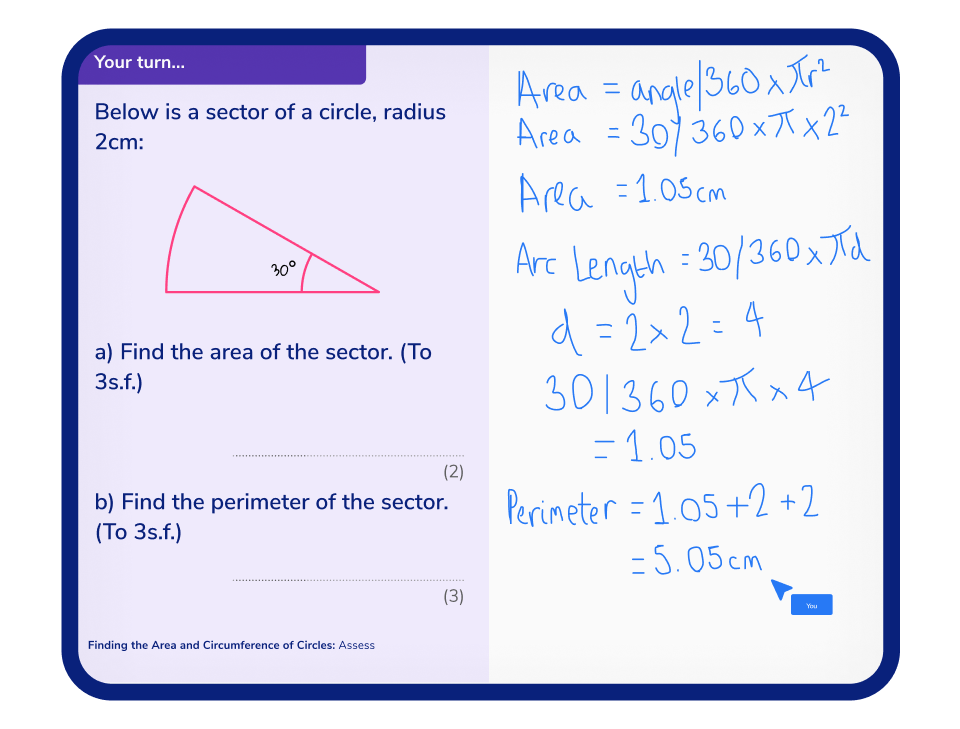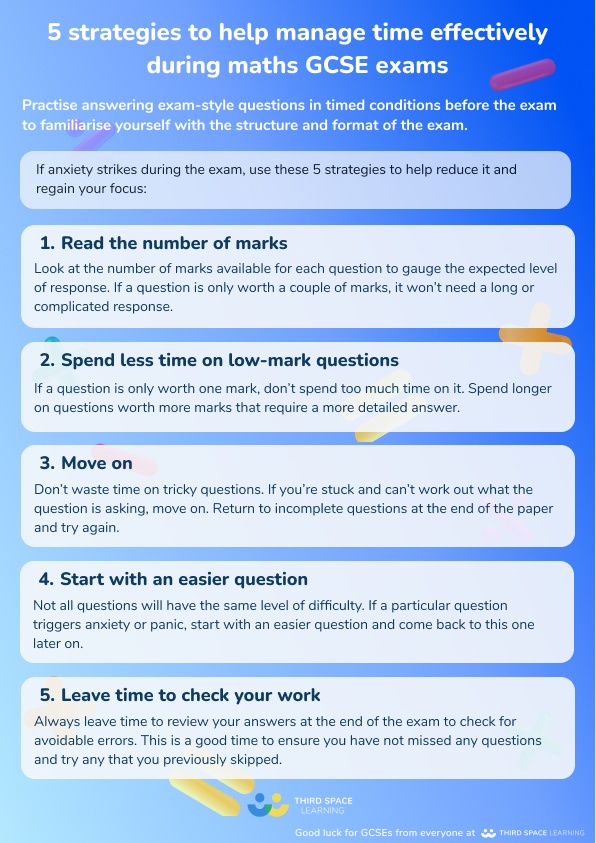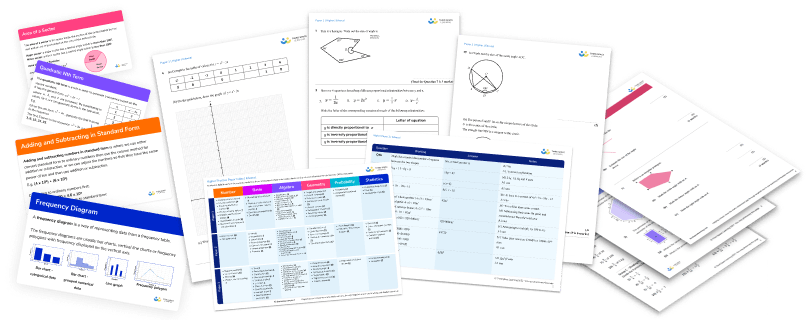How To Reduce Your Students’ Exam Anxiety: Practical Strategies From An Experienced Head Of Maths
Exam anxiety appears to be rising in the UK as exams and tests play a core role in the assessment of the UK’s education system. Exams are the primary measure of student’s academic success as well as educator and school performance.
Formal examinations, such as GCSEs and A Levels, carry additional pressure as results directly impact students’ options for further study and influence career paths.
While 79% of school leaders have noticed a general increase in stress, anxiety, and panic among their students, 81% of school leaders worry more about pupils’ mental health during assessment periods than before.
This article explores the key role schools and teachers play in helping students overcome exam anxiety and provides expert practical advice on managing exam-related stress before, during and after any tests.
What is exam anxiety?
Exam anxiety is a heightened feeling of worry or fear around exams. Putwin and Daly (2014) found that in a class of 30, around 5 are likely to experience test anxiety which may lead to:
- Panicking or feeling overwhelmed during exams
- Incomplete exam papers
- Absence from exams
Anxiety is a feeling of unease, such as worry or fear, that can be mild or severe.
Definition of anxiety from the NHS
Ultimate guide to GCSE maths revision
Strategies and practical techniques for maths teachers and subject leaders to support students to revise effectively and manage exam anxiety.
Download Free Now!Feeling some degree of anxiety is normal when faced with a high-pressure situation or when there is a lot at stake.
For many students, GCSEs are the first time they experience a high-pressure situation. Unsurprisingly, some students experience considerable anxiety, especially if they are not adequately equipped to manage it. Research suggests around 15% of GCSE students may fall into the category of being ‘highly test anxious’ (Putwain & Daly, 2014).
In some cases, anxiety can be helpful. In highly pressured situations, the body releases stress hormones, such as adrenaline and cortisol, which:
- Provide energy
- Help with decision making
- Allow clearer thinking
These hormones can be useful if you’re about to sit an exam. However, exam anxiety can also negatively impact students’ general mental health and well-being. Particularly when students sit a large number of GCSEs within a short time frame.
When prolonged, exam stress and anxiety can become a problem.
What causes exam anxiety?
Although more prevalent around exam season, test anxiety can occur at any point in the school year. Exam anxiety may also occur during lower-stakes testing situations, such as end-of-year tests.
Students’ perceptions of the importance of a particular test or exam may be different to those of the teacher. They may worry about disappointing parents and carers, or moving sets due to low test scores.
Varying factors may cause or exacerbate exam anxiety. It can help to work out anxiety triggers for your students to help provide individualised support.
Causes of exam anxiety include:
- Lack of preparation — both subject knowledge and exam technique
- Fear of failure
- Internal and external pressure
- Poor stress management and self-care
- Lack of confidence in their ability
- Low self-esteem, negative thoughts and self-doubt
- Previous bad experiences with tests and exams
- External factors which may already be increasing a student’s stress levels (e.g. changes to a family dynamic, illness, students with carer responsibilities)
- Existing mental health conditions
But there are strategies and approaches your students can implement to mitigate exam anxiety and reduce the negative impact on their well-being. As educators, it is important to provide students with the knowledge and resources to reduce exam anxiety. Below we provide you with strategies to better equip students to alleviate exam anxiety.
Exam anxiety and maths
Exam anxiety can be generalised, or closely linked to particular subjects students don’t enjoy and find difficult, often maths.
Unlike other subjects, people find it acceptable to be “bad at maths” or “hate maths”. Learners are exposed to these perceptions about maths in school and at home, which can encourage their own maths insecurities.
This increases the likelihood of developing maths anxiety — a response which occurs when required to do maths or even just thinking about maths.
Although more likely to affect girls than boys (Baxter et al,. 2014), maths anxiety affects students across attainment levels. Students who generally achieve well in maths may still experience anxiety.
Maths anxiety and test anxiety can be interdependent, leading to a vicious cycle.
- Students experience anxiety around maths testing
- This leads to poor test performance
- They develop negative perceptions about their ability in the subject
- Anxiety increases
How to recognise exam anxiety
Students who suffer from exam anxiety can experience a wide variety of symptoms. Some of these are easier to spot than others. It’s good practice to make students aware of these symptoms so they can recognise them in themselves as well as others and assess whether they need to seek additional support.
Physical symptoms of exam anxiety
- Rapid heartbeat and/or breathing
- Shaking, feeling restless or tense
- Stomach pain or nausea
- Headaches and dizziness
- Changes to sleeping patterns (insomnia, feeling unusually tired, sleeping more)
Mental symptoms of exam anxiety
- Difficulty concentrating, racing thoughts
- Feelings of anxiety which may extend to other areas of life
- Negative thoughts – feeling overwhelmed or unable to cope
- Depression and withdrawal
Behavioural symptoms of exam anxiety
- Sudden changes to behaviour, unlike their “usual” patterns
- Restlessness
- Avoidance of stressors (e.g. not revising, not attending exams)
- Lack of motivation
- Lack of enjoyment in other activities, particularly recreational activities or hobbies
What is the impact of exam anxiety?
Perhaps the most obvious and immediate impact of exam anxiety is on academic performance. If a student cannot perform to the best of their ability in an exam situation, the result they receive may not accurately reflect what they’re capable of.
This can have a wider impact on a student’s future prospects (for example, if a GCSE student does not achieve entry qualifications for the A-levels they wish to take).
Less visible are the effects on a student’s general mental health and well-being. Particularly if a student experiences exam anxiety over a prolonged period and cannot access support or coping mechanisms.
An inability to escape from feelings of anxiety around exams can leave the body in fight-or-flight mode. Long-term overproduction of cortisol and other stress hormones has significant negative effects on bodily functions and processes.
8 strategies for reducing exam anxiety before exams
1. Build exam familiarity
Ensure students are familiar with the format and structure of the exam. Introducing past papers and exam-style questions into lessons can build familiarity.
If students feel familiar with the look and style of the exam paper and question formatting, they will be less likely to feel stressed or anxious when faced with the materials in the actual exam.
Working in timed conditions also builds familiarity with the exam format. Regularly working through the first five or ten questions on a paper in a given time limit can replicate the exam setting in a low-stakes environment. Timed practice does not necessarily need to take place under test conditions.
Online one-to-one GCSE Revision Programmes use exam-style questions to familiarise students with the types of questions and formats they will encounter in their mocks and GCSE exams.
Maths specialist tutors work one-to-one with students and follow an ‘I do, you do, we do’ pedagogy to help students progress from guided to independent practice.
Challenge questions provide students with the opportunity to apply their maths knowledge and skills in an unfamiliar, exam-style context.

Read more: GCSE Exam Techniques
2. Take ownership of revision
Many students struggle to manage revision, particularly if they do not have support at home or an environment conducive to study.
Students should develop intrinsic motivation for revision. To help with this, students should take ownership and organise their revision.
Ensure students are aware of the topics they need to prioritise and not be tempted to focus on topics they are already secure with. Practising things they can already do can lead to a false sense of revision.
Ask teachers or peers to mark answers and give feedback – if this isn’t possible encourage students to only look once the task is completed. Complete another question to prove the concept is secure.
Dedicate time to showing students how to create and use a revision timetable to make the most of revision time and reduce anxiety ahead of exams.
Read more: Developing a GCSE Revision Programme
3. Teach effective study habits
Don’t leave revision techniques too late, help students develop study skills and understand how to revise effectively in KS3, if not before.
Introduce students to the concept of cognitive overload and explain why cramming and leaving things until the last minute does not work. Encourage students to practice little and often.
Model how to revise for GCSE and how to revise for maths using effective revision strategies.
- Focus on doing maths rather than reading notes to maximise knowledge retention.
- Leave phones and distractions in another room, lock them away if need be.
- Use timers to help get a set amount of undistracted revision completed.
- Take regular breaks, move away from your desk and then return to another set period of revision.
4. Build confidence and self-belief
Confidence and self-belief can combat maths and test anxiety. Both of which are often rooted in a fear of failure. Setting students up for success is one of the best ways to build confidence.
Careful consideration of the pitch and pace of maths lessons is required. Select topics that give students plenty of opportunity to experience success. This builds confidence both in the teacher and their own ability so that they are better able to tackle more challenging topics later on.
Read more: How Students’ Attitude Towards Maths Can Affect Lesson Outcomes And Their Confidence In Maths
5. Implement relaxation techniques
Relaxation techniques are useful during periods of anxiety or stress. They help to calm the fight-or-flight response and allow the person experiencing anxiety-related symptoms to reset and re-gain control of their body’s responses. These can be particularly helpful for more extreme anxiety reactions, such as panic attacks.
Not all relaxation techniques will work for all students, individuals will have their own preferences and it’s worth introducing students to a wide variety of techniques.
Here are a few relaxation techniques to introduce to students:
Deep breathing exercises
These aim to reduce heart rate and calm the body’s physical stress responses. After you teach students deep breathing exercises in class, they can use these before, during and after the exam to help calm anxiety and stress.
Deep breathing techniques to try:
- Four count – breathe in for the count of four and out for the count of four
- Star breathing – students use their index finger to trace their other hand while breathing in and then repeat breathing out
- Figure of 8 – on the inside of the forearm, students breathe in as they trace a figure of 8 and repeat while they breathe out
- Butterfly breathing – with thumbs linked and hands flat on their chest, instruct students to lift one hand as they breathe in and lower as they breathe out, they should alternate hands as they repeat
For more breathing techniques, visit the NHS website.
Mindfulness
Instruct students to observe the present moment. This may include observation of bodily responses, thoughts or external surroundings.
Mindfulness aims to calm thoughts and focus on the present moment. MIND charity notes that, while some people find this strategy very useful, it does not work for everyone.
6. Listen to music
When humans listen to music, it helps distract from unhelpful thought processes. It may even activate pleasure centres in the brain and trigger a release of the feel-good chemical, dopamine.
7. Take a technology break
Most students constantly have their phones close by or spend excessive hours using technology. Encourage students to take a break from technology as this has significant positive effects.
Less time spent on technology reduces the information absorbed from sources such as social media. This gives the brain a break from constant stimuli or situations demanding a response.
Some schools have gone as far as to introduce a digital detox programme where students volunteer to hand their phones in until after the GCSE period. Half of the Year 11 pupils at Michaela School volunteered to give up their phones until sitting their GCSE exams.
8. Promote self-care
People who operate at a high level of systemic stress are more likely to develop anxiety. While self-care seems to be promoted everywhere, the principles are backed by science.
Self-care techniques work by reducing cortisol and other stress hormones, allowing the body to return to a more natural equilibrium.
Here are some self-care strategies to promote to students:
Exercise
Regular exercise decreases muscle tension, raises heart rate and releases feel-good hormones such as serotonin and dopamine. These hormones combat the negative effects of stress hormones.
Get a good night’s sleep
A night of good sleep helps to regulate cortisol production, leave mobile phones and tables outside the bedroom to help get a good 8 hours sleep every night. Regularly not getting enough sleep in itself leads to exhaustion and an elevation of cortisol levels. This is counterproductive when trying to reduce stress.
Eat a balanced diet
Eat well and drink lots of water. A balanced diet helps to keep blood sugar stable, which maintains a systemic balance and keeps mood and energy levels more consistent.
While it may be tempting to reach for energy drinks and processed food, ditch the crisps, chocolate bars and fizzy drinks. A well-fed and rested brain will be alert and ready to confidently tackle the exams.
Make time for hobbies
Take time for enjoyable activities to reduce and mitigate exam anxiety in the lead up to exams. Participating in fun activities once again reduces cortisol and releases happy endorphins.
How to cope with exam anxiety during maths tests
For optimal performance and maximum marks, students must remain calm during exams. There are techniques for both the physical symptoms of anxiety and practical tips to stay calm during an exam.
Students will be able to recall information more efficiently and reduce anxiety during an exam using the advice below.
Stay calm and focused
Exam anxiety during tests can often appear as an extreme or panicked response with significant physical symptoms such as shaking, rapid heart rate, nausea and dizziness.
Students need to be equipped to get these physical symptoms under control. Here are a few suggested strategies:
- Deep breathing
- Positive self-talk
- Focus on an object – examine an object on the desk to distract the brain
- Visualisation – focus on a situation which evokes a positive response
Explain to students they are far better to take a few minutes to calm themselves and re-centre their brains rather than press on with the exam if they feel like they are panicking.
How to manage time effectively during the exam
Teach students how to use exam time effectively during exam preparation to reduce exam anxiety on the day.
Here are a few suggestions to share with students for maths exams:
- Use the number of marks available for each question to gauge the expected level of response. If a question is only worth a couple of marks, it won’t need a long or complicated response.
- Don’t spend too long on low-mark questions. If students spend a lot of time on a low-mark question, they’ve probably made an error or need to re-read the question to check they’re on the right path.
- Move on to the next question if you are stuck. Return to incomplete questions at the end of the paper and try again.
- Start with an easier question. If a particular question triggers anxiety or panic, start with an easier question and come back to this one later on.
- Leave time at the end of the exam to check for avoidable errors, particularly on single-mark questions that will be marked right or wrong.

Approach questions strategically
Strategic approaches are particularly useful with longer questions that require problem-solving or applying methods to unfamiliar contexts.
These strategies are most effective when embedded throughout the school, not only during exam preparation.
Here are a few strategies and approaches to answering exam-style questions:
Identify command words
Encourage students to highlight the command words in the question, for example, write down, work out, show, prove etc.
In some cases, command words such as “factorise” or “reflect” tell students exactly which skill or method to apply.
Command words like “evaluate” can indicate the form an answer should take, if they end up with an answer that isn’t numerical to an “evaluate” question, this indicates that they’ve made an error.
Read the question carefully
Ensure students read the question carefully before they begin to answer. It can be good practice to re-read the question sentence by sentence and underline any key points or values.
If the question contains a lot of information, for example, draw a Venn diagram from worded information, it can be helpful to tick off or mark when a certain piece of information has been used.
Students are extremely unlikely to be given superfluous information in a GCSE exam.
Record the method used
This is particularly important for students to remember on calculator exam papers where they do not need to work the answer out using written methods. Anything that is typed into a calculator should also be recorded on the page to gain maximum marks.
Work through blank mind moments
It is normal to experience blank mind moments during an exam no matter how much revision students have done or how well prepared they are. If students can anticipate these moments, it can help to avoid a panic response in the exam.
Encourage students to do something else for a few seconds or minutes to deal with these moments. This may involve moving on to another question, or taking a short break and using one of the refocusing techniques above. If students try to push through, it is unlikely to work and may create additional anxiety.
When students return to the question, students can try to trigger related memories around the topic. For example, create a quick mind map of related concepts to help provide a way around the block.
Emphasise that it’s alright if students cannot work around that block. There are over 20 questions on a GCSE maths paper, if they struggle to answer one question it isn’t significantly problematic. They do not need to aim for perfection.
When should you seek additional help?
The strategies and ideas discussed in this article may help students with mild or moderate exam anxiety, particularly if it only occurs during high-stress periods such as exam season.
If exam anxiety is affecting a student’s daily life and they are constantly worrying about exams with a significant impact on their physical and mental health that student may be experiencing an anxiety disorder and require professional support.
Depending on your school’s policies, this may need referring to the student’s form tutor, wider pastoral care or safeguarding team for further intervention.
Exam anxiety can reduce a student’s ability to perform in exams, increasing their chances of underachieving and receiving a result that does not reflect their true ability.
While exam anxiety is more likely to occur at high-stakes assessment points, such as the summer GCSE season, it can occur at any time and in response to lower-stakes testing.
Exam anxiety can exacerbate general maths anxiety and have a significant impact on a student’s mental and physical well-being. Be watchful for significant changes in behaviour that may suggest that a student needs wider mental health support.
Educators can help teach young people ways to manage stress and anxiety related to exams and support them in developing coping strategies that work for them.
Explain that anxiety is a normal human response and that it can be helpful and set students’ minds at rest. Provide students with a toolkit to deal with anxious feelings related to exams can help ease the discomfort.
Remind students that they do not need to cope with these feelings on their own and discuss when to seek additional support.
Exam anxiety FAQs
To help overcome exam anxiety, it can help to perform relaxation techniques, ensure you are well prepared for the exam and revise the topics you need extra support with. Eat a well-balanced diet and drink plenty of water to fuel your brain in the best way possible to prepare you for your exams.
Use relaxation techniques such as deep breathing to help relax before or during an exam. Move onto an easier question if you are stuck and come back to the harder questions at a later point in the exam. Focus on an object you can see until the anxiety subsides and then return to the question.
Test anxiety can occur for many reasons. It may be linked to fear of failure, high expectations, pressure to perform or perfectionism. There are many methods to reduce panic during exams such as being well prepared, adequate revision and a well-balanced diet.
DO YOU HAVE STUDENTS WHO NEED MORE SUPPORT IN MATHS?
Every week Third Space Learning’s specialist online GCSE maths tutors support thousands of students across hundreds of schools with weekly online 1 to 1 maths lessons designed to plug gaps and boost progress.
Since 2013 these personalised one to one lessons have helped over 150,000 primary and secondary students become more confident, able mathematicians.
Learn about the GCSE revision programme or request a personalised quote for your school to speak to us about your school’s needs and how we can help.





